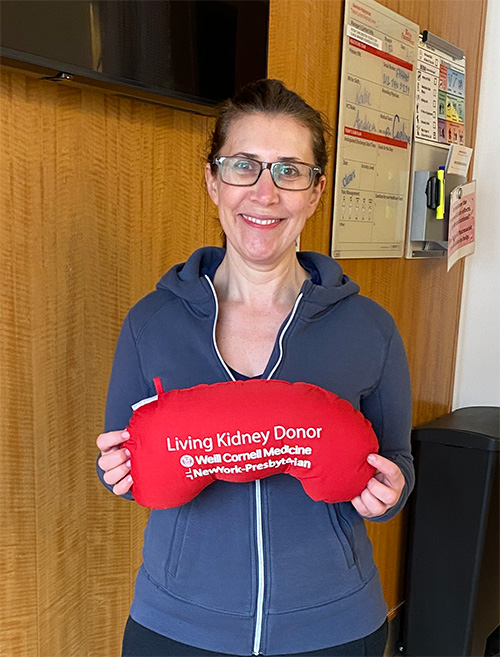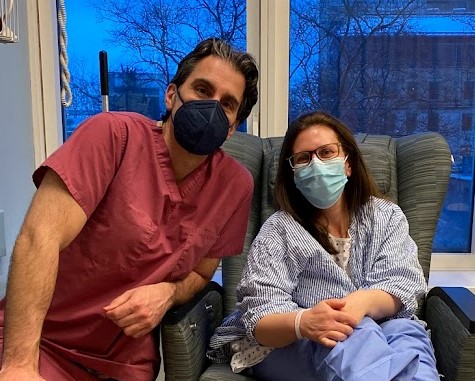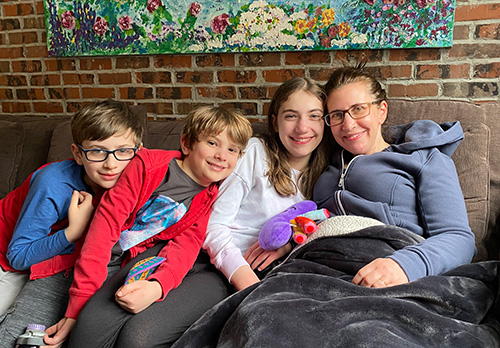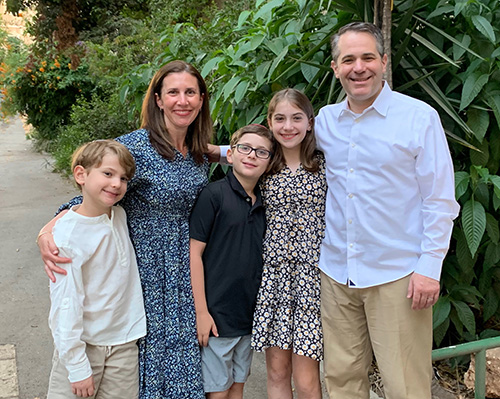My Kidney Donation Story: Annie Hoffnung
The story of my kidney donation began when I came across an advertisement in my synagogue’s bulletin seeking a donor for a fellow member in need of an urgent transplant. The ad went on to encourage those who have A+ or O+ blood type to register online to schedule a compatibility test. Knowing I have A+ blood type, I turned to my husband, Ari, and asked if I should consider getting tested.

Ari, who wholeheartedly supported the idea but was not a huge fan of hospitals or needles himself, encouraged me to get tested. After witnessing C-sections for the births of all three of our children, he knew I had a fairly high tolerance for pain. He also pointed out that it was “a rare opportunity to do an extraordinary mitzvah (the Hebrew word for a good deed) of saving another person’s life.”
After completing the initial compatibility bloodwork at Weill Cornell Medicine’s renowned Kidney Transplant Program, I received the exciting news that I was a strong match. However, another donor who had progressed further in the process was ultimately chosen, rendering my kidney unnecessary in this case.
I experienced a blend of confusing emotions, including disappointment that I was being deprived of a special opportunity and some degree of relief that I would be spared from undergoing a major surgery. I thought that was the end of my kidney donation journey.
As a family, we agreed that this was not just important, but the right thing to do.
Annie Hoffnung
However, several weeks later I received a call from a social worker at Weill Cornell Medicine who introduced me to the concept of becoming a non-directed, or altruistic, kidney donor. This discussion opened my eyes to the possibility of donating my kidney to someone I didn’t know. The idea resonated deeply with me, and I eagerly discussed it with my family, including my three children. We collectively recognized the life-changing impact it would have, not only for me but more importantly, for the recipient, who was desperately in need of a new kidney, as well as for their loved ones.

During our heartfelt discussions, we contemplated the potential chain reaction that could unfold if I were to donate my kidney to someone on the waiting list. We envisioned a scenario where someone else would move up on the list, increasing their chances of finding a suitable match sooner. It became clear that my donation would reduce the waiting list by one person, allowing more people to spend time with their loved ones. As a family, we agreed that this was not just important, but the right thing to do.
As I proceeded through the required battery of eligibility tests, I received guidance and support from many sources, for which I am eternally grateful. I consulted with family and close friends and connected with other kidney donors to seek advice on how best to prepare myself for the journey ahead. I also sought counsel from my rabbi and read two books about becoming a living organ donor, which offered valuable insights through personal accounts and anecdotes from donors.

My surgery took place on February 28, 2023. Despite challenging weather conditions, a special medical courier successfully transported my kidney to LaGuardia Airport and it was safely flown to Vanderbilt Medical Center in Tennessee. Eighteen hours later, the news we had anxiously awaited arrived—my kidney had been successfully implanted and was functioning perfectly in its new host. The overwhelming emotions that washed over me upon hearing this were indescribable—it was one of the most profound experiences of my life.
I am now nearly five months post-op and feel better than ever. Reflecting on this experience, the idea of donating a kidney never crossed my mind. It wasn’t something I had ever considered. However, fate intervened, presenting me with an unexpected opportunity that stirred something deep within me. I am immensely grateful that I was in good health and able to embark on this journey.
Although I relinquished something that appeared unnecessary, I gained an immeasurable amount in return—both in personal growth and in having a transformational impact on the life of another human being.
Annie Hoffnung
Equally important was my unwavering support system—from my family, community, and colleagues. Without it, I could not have undertaken this endeavor. Although I relinquished something that appeared unnecessary, I gained an immeasurable amount in return—both in personal growth and in having a transformational impact on the life of another human being.
I am also overjoyed that I am now in touch with my recipient—I wasn’t sure I would be—and the best news is that she is doing remarkably well and no longer needs to undergo the burdensome dialysis treatments that once plagued her day-to-day life.
It was also a delightful surprise to discover that she has affectionately named her newfound organ “Katie the Kidney!” During its time in my body, I hadn’t given the kidney a name, but I am over the moon to know that it now has its own identity and is fulfilling its purpose with remarkable success.
About the Author

Annie resides in the Riverdale neighborhood of the Bronx, NY, along with her husband, Ari, and their three children: Violet (14), Teddy (12), and Jack (10). She is an active volunteer in her local community and participates in the Hebrew Institute of Riverdale’s Meals on Wheels program, which delivers meals to local residents. Professionally, Annie serves as the Chief Human Resources Officer at Joele Frank, a strategic financial communications and investor relations firm. Annie is particularly proud of the fact that following her organ donation, Joele Frank’s board adopted a special organ donor leave policy to support any employee who becomes a living donor and is now a member of the American Society of Transplantation’s “Circle of Excellence” – a corporate program that celebrates companies helping to eliminate barriers to living donation.